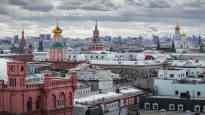MOSCOW In the streets of the central center of the Russian capital, festive lights shine brightly as Russians prepare to celebrate the New Year. Meanwhile, in many Ukrainian cities, people are trying to get by without electricity after Russian bombings.
Mayor of Moscow By Sergei Sobyan has tried to maintain the impression of normality. But even in Russia, the shadow of war hangs over the coming celebration – and persistent speculations about the second wave of the campaign.
President Vladimir Putin never signed the official ukas, i.e. the decree on the end of the “partial” business launch announced at the end of September.
So it’s no wonderthat the motion proposal has remained haunting in the consciousness of the Russians.
Putin’s press secretary Dmitry Peskov has repeatedly had to deny that the Kremlin would discuss the continuation of the motion.
Peskov’s credibility is eroded by the fact that he assured only a week before Putin’s September motion declaration that the Kremlin would not discuss the motion.
On the other hand, it may also be that there is not a single big wave of movement coming right away.
The authorities have had great difficulties in properly equipping, training and housing the hundreds of thousands of conscripted men.
However, the rumors live on. On Saturday, the Russian Ministry of Defense had to deny the information that conscript service would be returned from one year to two years.
In an interview with Dmitrov-TV, which operates in the Moscow region, the military official responsible for recruitment went on to say that conscripts accepted in the spring call-ups would serve for one and a half years, and those taken in the fall call-ups for two years.
– I consider it a completely logical decision, because our northern neighbors are joining NATO, the military commissar of the cities of Dmitrov, Dubna and Taldom Mikhail Fokin told Dmitrov-TV, referring to Finland’s and Sweden’s NATO applications.
The video was later removed from YouTube. Kremlin Peskov has said twice before that the Kremlin is not talking about extending conscript service.
The launch brought the war on the skin of ordinary Russians on a completely different level of concreteness than the February declaration of a “military special operation”.
The decline in the social atmosphere was reflected in opinion polls, and the Kremlin closely monitors opinion polls.
It is telling that entertainment programs have started to return to state television channels, from which they were purged when Russia started an aggressive war against Ukraine in February.
A decline has been observed in the viewership of talk shows that contain harsh war messages.
The Kremlin has a conflicting communication problem on its hands. On the one hand, citizens should not be incited into panic and anxiety, on the other hand, the prolongation of the war must be justified so strongly that the whole project does not start to look like a mistake by President Putin.
In the propaganda about the war, a big showdown with the West, especially the “Anglo-Saxons”, i.e. the United States and Britain, has been built.
This is how the Russians are being prepared for a long war and economic confrontation.
The presenter who has become a central television war hawk Vladimir Solovyov painted Polnyj kontakt in its transmission (you switch to another service) doomsday images: a holy war is going on, a battle against Satan himself and the little devils.
Singer and ruling party United Russia MP Denis Maidanov in turn published crossing song (you switch to another service) for intercontinental Sarmat nuclear missiles.
In propaganda acts like the Sarmat song, you can see the need of political entrepreneurs to get attention and publicity.
The second lyricist of the song is a well-known nationalist politician Dmitri Rogozhin, whose career has been on the decline. Last summer, he was fired from the leadership of the Roskosmos space company.
Such figures as Rogožin and the former president Dmitry Medvedev seem to see the war as an opportunity to raise their lowered profile with more dramatic public exits.
At the same time, quiet technocrats like the Prime Minister Mikhail MishustinGovernor of the Central Bank Elvira as Nabiul and head of the large state-owned Sberbank German Gref are focused on keeping the wheels of the economy turning and softening the blow of Western sanctions.
For relatively liberal technocrats like Gref and Nabiullina, the “special military operation” announced by Putin in February most obviously came as a big shock, as The Financial Times writes. They still did not abandon the administration.
The central bank led by Nabiullina has so far managed to keep the ruble’s exchange rate quite strong in relation to the dollar and the euro.
Many Russians are used to inferring the state of the economy from the exchange rate of the ruble, so artificially maintained stability calms feelings.
On the other hand, the long-term outlook for the economy is not good. Nabiullina has also warned that the country is threatened with a labor shortage due to the business launch.
According to Nabiullina (you switch to another service) business launch weakens inflation at first because demand falls, but then labor shortages in certain sectors of the economy can accelerate inflation.
The labor shortage will certainly not be eased by the fact that the Russian Duma is preparing a law that would limit the rights of those who have left the country to work remotely in Russia.
Up until now, IT experts who escaped from Russia to start a business have still been able to work remotely for Russian companies. The law would therefore be a new blow to companies, and Russia’s Ministry of Digital Development has announced its opposition to the law.
However, the law is expected to pass, as the Duma continues to manufacture new laws that further tighten the authorities’ control over citizens.
The conflict between the needs of the security apparatus and the maintenance of the economy is therefore growing.
